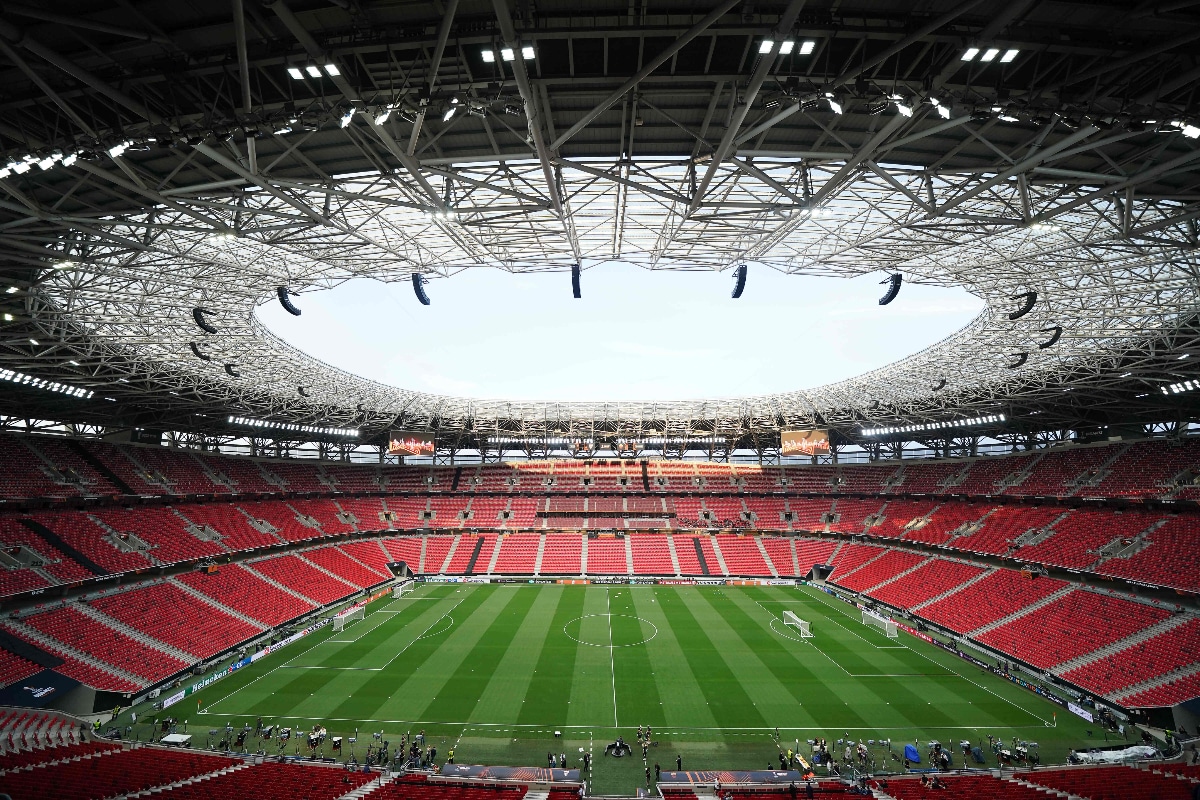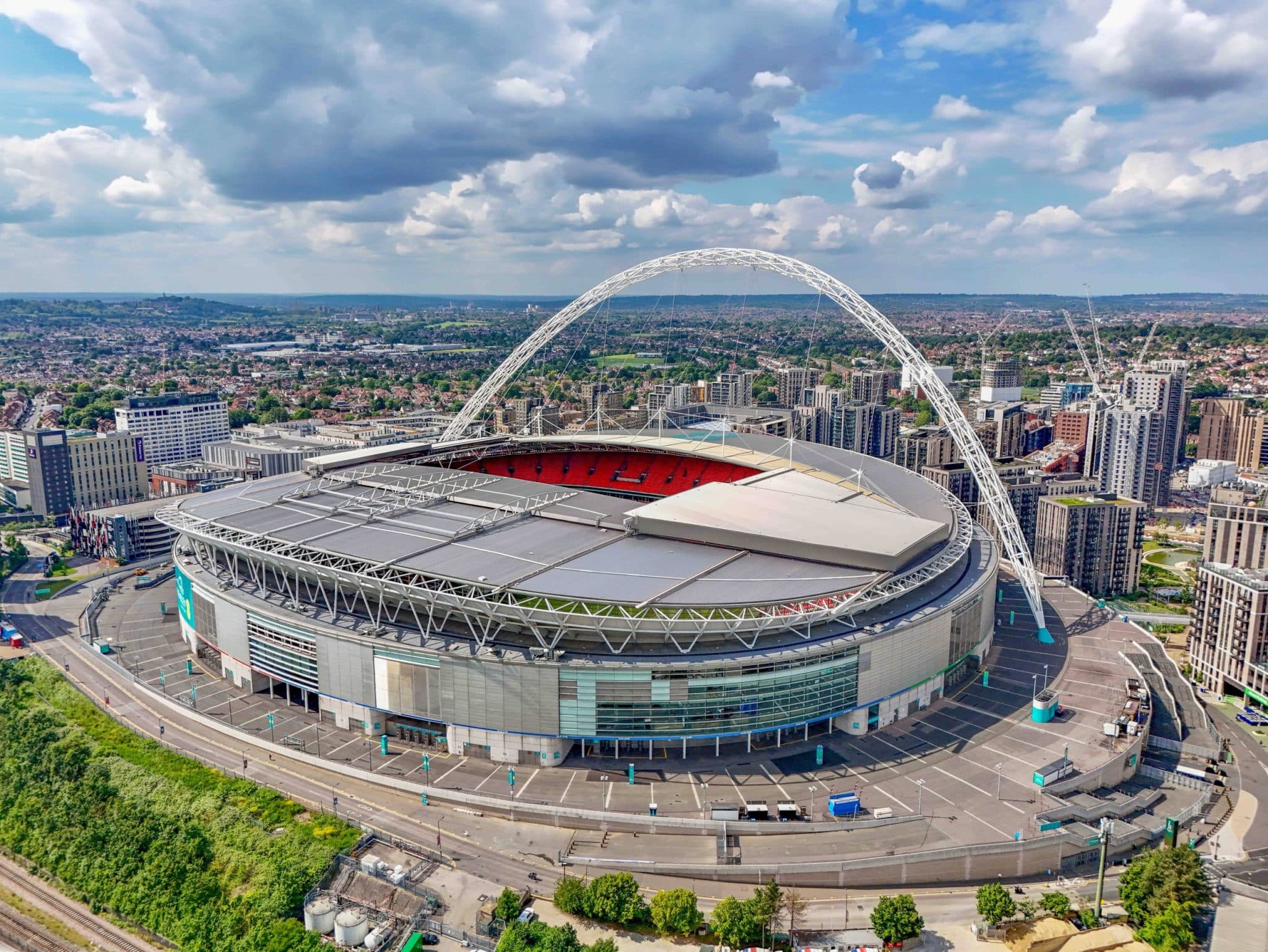
The Champions League is undoubtedly the most-watched club tournament in European football, and arguably in the entire world. It has been adored by fans for many years, renowned for bringing together the best teams, players, and managers, creating an unforgettable footballing spectacle.
However, what sometimes gets overlooked are the remarkable stadiums that host the Champions League finals, which play a crucial role in making these memorable nights possible. These venues can either enhance the experience or leave a disappointing impression on those in attendance.
From their atmosphere and architecture to accessibility and fan experience, the right setting can elevate a final into legend, while the wrong one can detract from even the greatest match.
Who will host the 2025/26 Champions League final?

Puskas Arena in Budapest, Hungary, will host the 2025/26 Champions League final, as announced by UEFA. This event will mark the 71st season of the Champions League, organised by the Union of European Football Associations, and will also be the 34th season of the tournament.
The date for the 2025/26 UCL final is set for 30 May 2026. However, this date may change depending on how the European football season unfolds, among other factors.
The Puskas Arena is one of the most iconic football stadiums in Europe, with a capacity of 67,000. It meets all FIFA and UEFA requirements. The Puskas Arena was built to replace the Ferenc Puskas Stadium, which was demolished in 2016. Both stadiums are named after Hungary's national football hero, Ferenc Puskas.
Apart from the 2025/26 UEFA Champions League finals, Puskas Arena has hosted some of the biggest football matches, including the 2020 UEFA Super Cup final, the 2020/21 European Championship, as well as Champions League and Europa League matches. In 2023, Puskas Arena hosted the Europa League final between Sevilla and Roma.
Champions League final stadiums overview
So, with so many stadiums to choose from in Europe, we have a feeling that you will have some fond memories of some of the games and stadiums we will be talking about, so let’s dive right in.
Estadio da Luz – Portugal
The Estadio da Luz hosted the 2019/2020 Champions League final between Bayern Munich and PSG, and also the 2013/14 final between Atletico Madrid and Real Madrid.
The stadium is well-equipped to handle events of this size, which likely explains why it has been selected twice. Built in 2003 for €162 million, it is a purpose-built venue that can accommodate nearly 65,000 spectators when at full capacity.
The two finals hosted at this stadium have been quite different. In the 2013/2014 final, Real Madrid triumphed over Atletico Madrid with a convincing 4-1 victory, even though the match went to extra time. This intense game was played in front of approximately 61,000 fans.
In stark contrast, the 2020 Champions League Final was held behind closed doors due to the Covid pandemic. Viewers at home witnessed Bayern Munich claim victory with a narrow 1-0 win against PSG.
Metropolitano Stadium – Spain
The 2018/2019 final was the only time in the last 10 years that two English teams competed for this trophy. Of course, this game was played between Tottenham and Liverpool, with 63,000+ spectators in attendance at the Metropolitano Stadium.
Although this final consisted of two English teams, the stadium is the home of Atletico Madrid. And in our opinion, out of the several Champions League final stadiums we’ve mentioned here, this one has one of the best atmospheres when the capacity reaches almost 100%.
This stadium has a rather unique history, too, as it was completely closed from 2004 to 2017, before being renovated for the cost of around €240 million. It would seem that the renovations caught the right people's attention, too, as it hosted this magnificent spectacle just two years later.
NSC Olimpiyskiy Stadium – Ukraine
Ukraine has had its fair share of turbulence over the years, although for the 2017/2018 final, the NSC Olimpiyskiy Stadium was selected to host the Champions League final. While the stadium allowed for a maximum capacity of just over 70,000, it supported over 100,000 fans back in 1977 when Bayern Munich played Dynamo Kyiv.
In 2018, Real Madrid defeated Liverpool by a score of 3-1. Of course, this was the infamous game where Ramos took the in-form Mo Salah out of the game by dragging him to the ground by the shoulder. Intentional or not, this has been a huge topic of discussion ever since the game, and it’s one of the most-talked-about Champions League moments of the last decade.
The match is also famous for a couple of the goals scored by Real Madrid on the night. The first one, scored by Karim Benzema, was one of the most freakish goals in UCL final history, while the second, scored by Gareth Bale, was a breathtaking overhead kick that is regarded by many as the best UCL final goal of all time.
Principality Stadium – Wales
Depending on which team you were rooting for in the 2016/2017 final, you would have felt absolute ecstasy or despair following the conclusion of this one. Real Madrid fans saw Los Blancos mount the first successful title defence since 1990, while Juventus fans saw their side lose their fifth consecutive Champions League final since lifting the coveted trophy back in 1996.
While Mario Mandzukic did score one of the best goals ever seen in a Champions League final, it still wasn’t enough to knock Real Madrid off their game. The stadium, too, was the perfect fit for this game.
The Welsh venue saw more than 65,000 pour through the doors for this game, and it was the very first time that a Champions League final was played with a closed roof.
It is the only time a British stadium, other than the iconic Wembley, has hosted a Champions League Final, and it remains a huge success to this day. The combination of an excellent hosting venue and a glorious gam of football made this one of the best Champions League finals in recent history.
The opening ceremony is under way! Follow the @ChampionsLeague final at the Principality Stadium here: https://t.co/0BeamEYMjo 🏆 #UCLfinal pic.twitter.com/7VhhXFga7B
— Sky Sports Premier League (@SkySportsPL) June 3, 2017
San Siro – Italy
The 2015/2016 final marked the start of a historic Real Madrid run, although we didn’t know it at the time. When Real Madrid managed to wriggle past Atletico Madrid at San Siro, the stage was set for the hat-trick of Champions League trophies that the club lifted.
Real Madrid won on penalties with a 5-3 scoreline in the dramatic cross-city clash. With almost 72,000 fans in attendance, we can only imagine the nerves when taking those final shots. With that said, it must have been magical at the same time to win at one of the biggest football stadiums in the whole of Europe!
Olympiastadion – Germany
Apologies if you are a Juventus fan, but the team was eventually outclassed in the 2014/2015 final, losing to Barcelona by a 3-1 scoreline. This game was played at the Olympiastadion in Germany.
Goals from Alvaro Morata, Luis Suarez and Neymar, Barcelona destroyed the Italian squad with fierce and skilful play. The 70,000+ strong crowd made it one of the best-attended finals over the last 10 years.
We must say, the Olympiastadion was a great pick over the other Champions League final stadiums that could have hosted the game. This was backed up by the fans' noise, the pitch's quality, and the event's general organisation, too. It was just magnificent, and we wouldn’t be surprised if the stadium is picked to host such an event in the future.
Wembley Stadium – England
Wembley Stadium has hosted the Champions League final on eight occasions, more than any other venue. One of its most memorable moments came in 2009 when the legendary Barcelona team, often regarded as the best club side of all time, defeated Manchester United 3-1. Goals from Pedro, Lionel Messi, and David Villa secured their victory.
Two years later, Wembley welcomed another final, this time featuring two German clubs, Bayern Munich and Borussia Dortmund. Matches between teams from the same country always create a unique atmosphere, and this encounter was no exception. Although it wasn't a high-scoring affair—Bayern won 2-1—the match was filled with flair and drama, living up to the hype surrounding it.
The most recent Champions League final at Wembley was between Real Madrid and Borussia Dortmund. Unfortunately, the Yellow and Blacks lost out again.

Allianz Arena – Germany
This was the only final in the last decade where one team had the chance to play at their home stadium. During the 2011/2012 final, Bayern Munich made the final and received the honour of playing in front of home fans at the Allianz Stadium.
In this contest, Bayern Munich faced an in-form Chelsea. The match was intensely competitive and went down to the wire, ultimately requiring penalties to determine the winner. Chelsea emerged victorious in the end. The Allianz Arena hosted 62,500 attendees for this match, creating an electric atmosphere, particularly with a German team in action.
And when we look back at some of our favourite Champions League final moments, we cannot ignore Didier Drogba’s chipped penalty during the shootout. Not only was this incredibly daring, but to have the courage and the audacity to do that in the first place was nothing short of legendary.
On 31 May 2025, the iconic Allianz Arena in Munich hosted another UCL final. This time, Paris Saint-Germain took on Inter Milan and won with a rare 5-0 scoreline.
For PSG, the 2024/25 UCL final marked the end of their European trophy drought, a significant milestone in the club's history. Even more noteworthy is that the win meant PSG completed the first treble in the club's history.
Having already secured two domestic trophies, the Ligue 1 title and the Coupe de France, PSG looked solid from the onset. On the other hand, Inter Milan's impressive journey in the Champions League saw them reach the final stage.
While Simone Inzaghi had diligently prepared his team for the final battle at Allianz Arena on 31 May, an embarrassing 5-0 defeat meant their dreams for a fourth UCL title would have to wait.
The prize on offer in Munich 🏆😍#UCLfinal pic.twitter.com/Ik18wjO5Qj
— UEFA Champions League (@ChampionsLeague) May 28, 2025
Santiago Bernabeu – Spain
Since Wembley hosted the 2010/2011 final, we will run through a bonus game here, highlighting the 2009/2010 final between Inter Milan and Bayern Munich. This stadium has been entertaining football fans since 1947, and with it being the home of Real Madrid, it’s a stadium that is just perfect for a Champions League final.
This game drew an impressive crowd, with the official attendance exceeding 73,000 fans. Inter Milan emerged victorious, defeating Bayern Munich 2-0, which undoubtedly inflated Jose Mourinho's already soaring ego! However, it was quite amazing to see Mourinho demonstrate his managerial abilities to achieve such success with Inter Milan. This was all done despite Bayern Munich being the overwhelming favourites.
Recent Champions League Finals
Here is a list of the recent UCL finals, where they were played, the season and who won.
| # | Champions League finals | Venue | Year | Winner |
| 1 | PSG vs Inter Milan | Allianz Arena, Munich | 2025 | PSG |
| 2 | Borussia Dortmund vs Real Madrid | Wembley Stadium, London | 2024 | Real Madrid |
| 3 | Manchester City vs Inter Milan | Ataturk Olympique Sadium,Istanbul | 2023 | Manchester City |
| 4 | Liverpool vs Real Madrid | Stade de France, Paris | 2022 | Real Madrid |
| 5 | Chelsea vs Manchester City | Estadio do Dragao, Porto | 2021 | Chelsea |
| 6 | PSG vs Bayern | Estadio da Luz, Lisbon | 2020 | Bayern |
| 7 | Tottenham vs Liverpool | Civitas Metropolitano, Madrid | 2019 | Liverpool |
| 8 | Real Madrid vs Liverpool | Olympic National Sports Complex, Kyiv | 2018 | Real Madrid |
| 9 | Juventus vs Real Madrid | Millennium Stadium, Cardiff | 2017 | Real Madrid |
| 10 | Real Madrid vs Atletico Madrid | San Siro, Italy | 2016 | Real Madrid |
| 11 | Juventus vs Barcelona | Olympiastadion, Berlin | 2015 | Barcelona |
| 12 | Real Madrid vs Atletico Madrid | Estadio da Luz, Lisbon | 2014 | Real Madrid |
| 13 | Borussia Dortmund vs Bayern | Wembley Stadium, London | 2013 | Bayern |
| 14 | Bayern vs Chelsea | Allianz Arena, Munich | 2012 | Chelsea |
| 15 | Barcelona vs Manchester United | Wembley Stadium, London | 2011 | Barcelona |
Champions League Final Stadiums – Key Records
Record for hosting the most finals
Out of the various Champions League finals stadiums we’ve discussed here, there is one that holds the title of the very best, and that Stadium is Wembley. Historically, this stadium has paved the way for the highest attendance figures for Champions League finals, and it has hosted the finals a total of seven times!
Then again, when you consider the size and stature of a stadium like Wembley, it’s hard for other stadiums in Europe even to compete, and we anticipate that Wembley will host many more finals in the future.
The club with the most Champions League titles
Surprise-surprise, the club with the most Champions League victories of all time is Real Madrid. These guys have won the Champions League an incredible 15 times, with the nearest team being Inter Milan, who have just seven in comparison.
Perhaps more impressively, four of Madrid’s titles have also come in the last decade, largely thanks to Cristiano Ronaldo and others. However, since the previous title came in 2018, you could say that Real Madrid is now on a drought of Champions League success by their standards!

